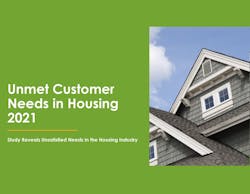Survey Reveals What 1,300 Homeowners Want Most (and Least) From Their Housing
To better satisfy its customers, the homebuilding industry needs to shift its mindset, according to Daniel Small, founder and CEO, Da Vinci Consulting.
In sum, it should take a needs-first approach, rather than its traditional solutions-first approach. Before focusing on its own solutions, the industry must closely examine its customers’ needs.
“Markets are usually defined by solutions,” Small said in a presentation for the Housing Innovation Alliance’s November 2020 Innovation Summit.
The problem with that, he explained, is that solutions constantly change. “That subjects you to obsolescence over time as the solution technology changes,” Small said. “Instead, I define your market based on the people using your solution and the job they’re using it to accomplish.”
What do consumers want from the housing industry?
So the industry should focus not just on providing housing units and developments, but instead on first asking the question: What precisely do people want their housing to achieve for them?
To illustrate the different perspective, Small referenced a quote from the late marketing professor Theodore Levitt: “People don’t want a quarter-inch drill,” Levitt once said. “They want a quarter-inch hole.”
“That is the difference between focusing on a solution—the drill—and focusing on the job that needs to be done—the hole,” Small said. This perspective is known as the Jobs-to-be-Done innovation theory.
To identify the holes that people want their housing to fill, Small, in partnership with the Housing Innovation Alliance, the University of Denver, and Build with Rise, last year conducted a survey of about 1,300 people who provide housing for themselves or their families. Participants included both homeowners and renters and represented a wide range of demographic backgrounds. (Download Daniel Small's PDF slide deck with an overview of the research findings.)
The study’s ultimate aim, Small explained, was to determine opportunities for devising innovative solutions that address unmet customer needs.
The survey asked respondents about 58 housing-related jobs, everything from sleeping to providing protection from the elements—“all the different things that people hope their housing will accomplish,” Small said. It asked people to indicate both the importance of those jobs and their satisfaction with current solutions.
By tracking both importance and satisfaction, the survey revealed a sweet spot of opportunity: the jobs that have a very high importance for people but whose current solutions leave them unsatisfied. “This is your goldmine,” Small said. “This is where the real opportunities are to add value for your customers.”
10 top opportunities for homebuilders
Here are the top 10 of the underserved jobs—the ones that are very important to customers but not well fulfilled:
- Sleep
- Recuperate and relax
- Prevent theft of possessions
- Prevent intruders from entering
- Store and organize possessions
- Prevent damage to possessions
- Keep interior living space clean
- Protect occupants from the exterior environment
- Prepare meals
- Minimize housing-related expenses
The overall themes of these top underserved needs include caring for occupants and their possessions, performing activities inside the home, and finances.
With those unmet needs uncovered, innovations can target them. Such solutions might encompass product design, building design, neighborhood design, services, and technology.
For example, innovative solutions for storing and organizing possessions could include new designs in cabinetry, shelving, bins, and furniture. Or a new app might help consumers make decisions on sorting and purging possessions.
Another example: To help keep potential intruders out, a neighborhood-design solution could improve the community’s lighting, gating, or security systems. Or a service solution could involve a security or neighborhood watch service.
In addition to identifying unmet needs, the survey pinpointed the needs that have been met: the housing-related tasks or services that are both extremely important to residents and very well satisfied. These are the table-stakes jobs, Small said: Any innovations in other areas must preserve satisfaction with these jobs. Of these, the top two are preventing physical harm to occupants and accessing clean water.
Arguably as important as knowing what people do want from their housing is knowing what they don’t. That saves time and money potentially spent on devising solutions that customers don’t want or need.
The survey found the following top 10 over-served jobs. These are not very important to respondents and/or they are already well satisfied:
- Generate income through rental or sub-lease
- Connect with neighbors
- Provide temporary residence for visitors
- Establish a commitment to the community
- Access equity financing for purchases
- Communicate with non-occupants
- Provide help or service to others
- Meditate, pray, worship
- Entertain visitors
- Conduct work or business
To download Daniel Small's PDF slide deck with an overview of the research findings, click the "Download PDF Report" button below.
